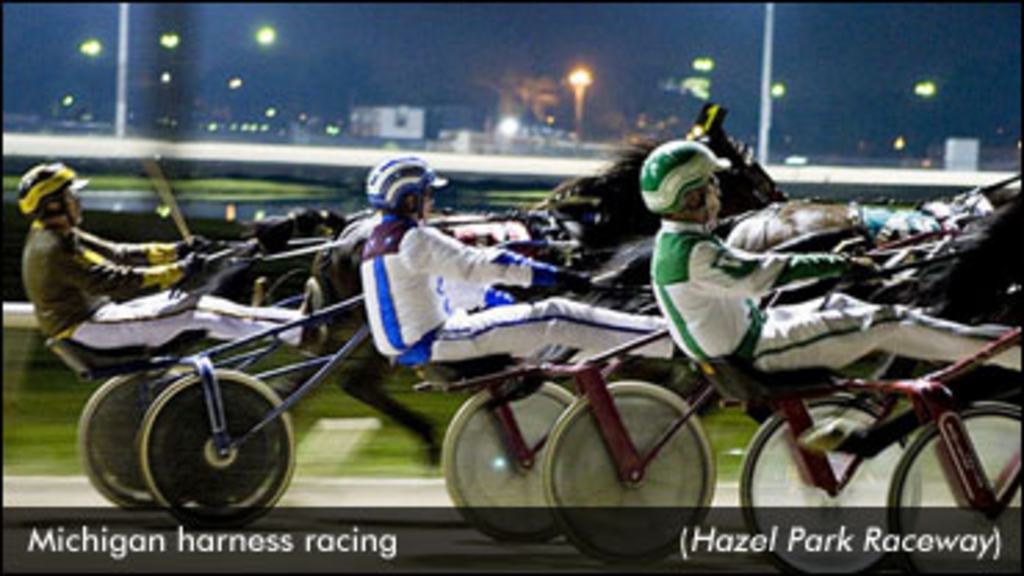Michigan Race Dates Slashed

The Michigan Harness Horsemen's Association (MHHA) issued a news release on Wednesday expressing concern for the future of harness racing in the state after the Michigan Gaming Control Board (MGCB) released orders yesterday to slash race dates for 2014.
The MHHA announced it is appealing the orders, which reduce harness meets at both Northville and Hazel Park raceways to just 10 days.
"We are horrified by the MGCB’s decision and have expressed our concerns about both the moral and legal implications of Tuesday’s orders," states the MHHA release. "Time will tell if the tracks’ apparent strategy to wrestle complete control of the industry away from the horsemen will succeed, but there is no question that the short term impact will be harmful to thousands of horsemen -- not to mention countless local agricultural economies around the state. In fact, just since the MGCB orders were released, we have received word that dozens of horses are already being culled from Standardbred stables across the state."
The MHHA release appears below in its entirety.
MGCB Race Date Orders Expected To Have Devastating Impact
The Michigan Gaming Control Board released orders on Tuesday (Jan. 21) dramatically reducing the harness racing schedule at Northville Downs and Hazel Park Raceway in 2014.
The orders, which are being appealed by the Michigan Harness Horsemen's Association, authorize 10 day harness meets at both Northville and Hazel Park. Those schedules represent a dramatic reduction from the harness dates previously anticipated.
Needless to say, the MGCB decision to accept the tracks’ amended applications will have a devastating impact on Michigan’s Standardbred race horse industry.
Even more devastating than the slashing of race dates is the timing of the schedule authorized for Northville Downs. Instead of beginning their meet Jan. 31, as originally announced, Northville intends to race Fridays and Saturdays from March 7 through April 5. Hazel Park intends to race their harness meet on Fridays, Saturdays, and Sundays from April 12 through May 3. According to Tuesday’s orders, both facilities will then convert to Thoroughbred tracks.
Despite Northville’s assertion that higher handle and lower track maintenance costs are the reason for their delayed start date, many believe that their strategy is to create as much disruption as possible for the Standardbred industry. Why you ask?
Delaying the availability of purse money until March will force more harness horsemen out of business and accelerate the decline of live racing -- something Northville has stated publicly they would prefer.
The MHHA and the racetracks have been at odds over track demands that horsemen pay entry fees for the privilege of racing at their facilities. It’s the tracks’ position that, because they are losing money, they are entitled to a greater share of simulcast purse pool revenue. Since the tracks already retain 60 percent of simulcast purse pool commissions, and their “solution” does nothing to solve the industry’s core problems, the MHHA has refused those demands.
The financial situation of our horsemen, who collectively lost well over $1 million in 2013, is more dire than the tracks’, so shoring up their bottom lines on the backs of our horsemen is not a reasonable solution. Further, the MHHA believes that, by law, the horsemen’s share of the simulcast purse pool can only be used for purses. While the Thoroughbred horsemen believe they have found a way to circumvent that 1995 Racing Law requirement, the courts may ultimately have to decide if they will be able to do so moving forward.
Recognizing the immediate impact that this MGCB decision would have on Michigan’s Standardbred industry, an emergency meeting of the MHHA Board of Directors was held late Friday. In an effort to mitigate the potential damage to our horsemen, the MHHA offered Northville Downs $100,000 in non-simulcast purse pool funds if they would agree to race their original 26 day schedule. That offer was ignored.
We are horrified by the MGCB’s decision and have expressed our concerns about both the moral and legal implications of Tuesday’s orders. Time will tell if the tracks’ apparent strategy to wrestle complete control of the industry away from the horsemen will succeed, but there is no question that the short term impact will be harmful to thousands of horsemen -- not to mention countless local agricultural economies around the state. In fact, just since the MGCB orders were released, we have received word that dozens of horses are already being culled from Standardbred stables across the state.
We ask all horsemen to be patient as the MHHA moves forward with its appeal of Tuesday’s orders and considers what further actions might be possible to try and mitigate the damage to our 2014 racing season. In the meantime, we encourage you to contact your representatives in Lansing. Make sure they understand what is happening in our industry and let them know how it impacts you and those with whom you do business. If the tracks believe they can force the Standarbred horsemen out of business in what appears to be an attempt to eliminate live racing here in Michigan, they should be prepared for a significant fight.
(With files from MHHA)

